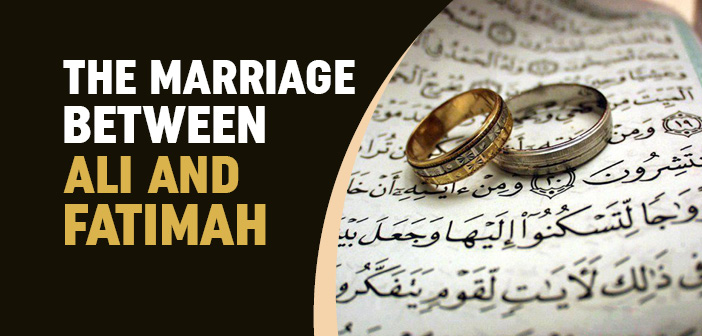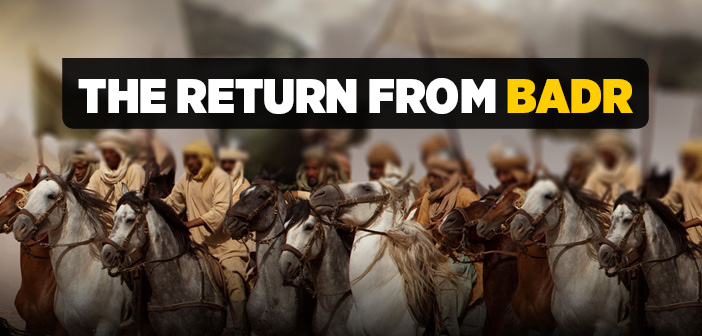Who is ali bin talib? Who is fatimah binti muhammed? How was marriage between ali and fatimah?
The second year of Hegira also saw the marriage between Fatimah -Allah be well-pleased with her-, the Blessed Prophet’s -upon him blessings and peace- daughter, and Ali -Allah be well-pleased with him-.
Many notables of Quraysh, including Abu Bakr and Omar -Allah be well-pleased with them-had previously proposed to take her hand in marriage but the Blessed Prophet -upon him blessings and peace- did not give consent, telling them, ‘he was waiting for a Divine verdict on her.’ For that reason, despite the encouragement of his relatives, neither could Ali -Allah be well-pleased with him- make a proposal. But a while later, with the insistence of his kin, Ali -Allah be well-pleased with him- made his presence next to the Blessed Prophet -upon him blessings and peace- .[1]
The rest of what happened is recounted by Ali -Allah be well-pleased with him-:
“At long last, I went to the Messenger of Allah -upon him blessings and peace-. He, as usual, was there with his entire majestical presence. I sat in front of him and kept silent. I could not say a word.
‘Why have you come; do you need something?’ he asked. ‘It appears you are here to ask for Fatimah!’
‘Yes’, was all I could say.” (Ibn Kathir, al-Bidayah, III, 379)
With the blessings of the Noble Prophet -upon him blessings and peace-, Ali -Allah be well-pleased with him- sold some of his property and prepared a mihr of 480 dirhams. The Blessed Prophet -upon him blessings and peace- advised him to spend two thirds of it on purchasing fragrances and the remaining one third on clothes.[2]
As trousseau, the Noble Prophet -upon him blessings and peace- presented Fatimah -Allah be well-pleased with her- with a linen cover, a water bottle and a cushion stuffed with the grass-like idhir.[3] To Bilal, he then said:
“I want it to become Sunnah for my ummah to serve food during their weddings”, asking him to organize the preparation. Ali -Allah be well-pleased with him- then pawned his shield to a Jew and bought half a scale of barley, from which a sweet dish called hays[4] was prepared as walimah, or the wedding feast. The Ansar and Muhajirun arrived in groups to attend the meal. (Ibn Sad, VIII, 23; Abdurrazzaq, V, 487; Diyarbakri, I, 411)
Afterward, sending for a jug of water, the Blessed Prophet -upon him blessings and peace- took wudu. He then called Ali -Allah be well-pleased with him- next to him and sprinkled some of the water on his chest and between his shoulders. Then he also called Fatimah -Allah be well-pleased with her- and did the same to her, remarking he had wed her to the best of their kin. Then to their faces and also behind them later on, the Blessed Prophet -upon him blessings and peace- prayed:
“Allah…I seek refuge in you, from the banished Shaytan, on behalf of them and their progeny!” (Ibn Sad, VIII, 24; Diyarbakri, I, 411)
The Blessed Prophet -upon him blessings and peace- then advised Fatimah -Allah be well-pleased with her- to attend to household chores and Ali -Allah be well-pleased with him- to earn for his family.[5]
Zayd ibn Haritha -Allah be well-pleased with him- explains:
“I was sitting with the Messenger of Allah -upon him blessings and peace- when Ali and Abbas -Allah be well-pleased with them- came and asked permission to enter.
‘Do you know why they have come?’ the Messenger of Allah -upon him blessings and peace- asked.
‘No I don’t’, I replied.
‘But I do’, said the Messenger of Allah -upon him blessings and peace-, ‘allow them to enter.’ So I let them in.
‘Messenger of Allah…We have come find out who the dearest to you from your kin is’, they said.
‘Fatimah bint Muhammad’, responded the Messenger of Allah -upon him blessings and peace- .
‘We do not mean your immediate family, Messenger of Allah!’
‘Then then my dearest kin is Zayd, whom Allah has favored through guidance and I have cared for.’
‘And then?’
‘Ali!’ replied the Messenger of Allah -upon him blessings and peace- .
‘You have relegated your uncle to last’, complained Abbas -Allah be well-pleased with him-.
‘But Ali acted before you in Hegira’, he then explained.” (Tirmidhi, Manaqib, 40/3819)
Narrating the below is Ibn Abbas -Allah be well-pleased with him-:
“The Prophet of Allah -upon him blessings and peace- drew four lines on the ground and asked us why he had done so.
‘Allah and His Messenger know best’, we said. Thereupon the Messenger of Allah -upon him blessings and peace- said, ‘The most virtuous of the women of paradise…Khadijah bint Khuwaylid, Fatimah bint Muhammad, Maryam bint Imran and Asiyah bint Muzahim, the wife of the Pharaoh.’” (Ahmad, I, 293)
The Blessed Prophet -upon him blessings and peace- was sensitive in attending to the education of his family members, nurturing them spiritually and preparing them for the eternal life. Following the revelation of the following ayah, for instance, from al-Ahzab:
“O wives of the Prophet! you are not like any other of the women; If you will be on your guard, then be not soft in (your) speech, lest he in whose heart is a disease yearn; and speak a good word. And stay in your houses and do not display your finery like the displaying of the ignorance of yore; and keep up prayer, and pay the poor-rate, and obey Allah and His Messenger. Allah only desires to keep away the uncleanness from you, O people of the House! And to purify you a (thorough) purifying…” (al-Ahzab, 32-33), the Blessed Prophet -upon him blessings and peace- continued every morning for six months to stopover at the door of Fatimah to call out, “Wake up for salat, People of the House, for Allah only desires to keep away the uncleanness from you and purify you a thorough purifying” (Tirmidhi, Tafsir, 33/3206)
Similarly, to remind them of tahajjud salat, one of the most important guarantors of a blissful eternal life, the Blessed Prophet would sometimes knock on the door of Ali and Fatimah, and gently say, “Are you going to offer salat?” (Bukhari, Tahajjud, 5)
In relation, Ali -Allah be well-pleased with him- recounts the striking incident below:
“Out of all the members of their family, the dearest to her father was Fatimah. Her hands would develop scars from spinning the grinder and her neck from carrying the waterskin. Sweeping around the house would moreover leave her in dust. Some slaves had been brought at one stage to the Blessed Prophet -upon him blessings and peace- .
‘You should ask for a slave from your father’, I suggested to her.
So Fatimah went, but seeing her father talking with some other people, she turned back. The next day, the Prophet of Allah -upon him blessings and peace- returned the visit.
‘What was it that you needed?’ he asked. Fatimah kept silent and did not answer.
‘Let me explain, Messenger of Allah…’ I then broke in and began to explain the matter.
‘Fear Allah, Fatimah, and carry out what He has commanded!’, then said the Messenger of Allah -upon him blessings and peace-. ‘Attend to your family and before you go to sleep, say Subhanallah thirty-three times, Alhamdulillah thirty-three times and Allah-u Akbar thirty-four times; all of them add upto a hundred. This is better for you than a servant.’
‘I am pleased with Allah and His Messenger’, said Fatimah. Thus the Messenger of Allah -upon him blessings and peace- did not give her a servant.” (Abu Dawud, Kharaj, 19-20/2988)
In another narration, the Blessed Prophet -upon him blessings and peace- is also reported to have said, “By Allah, I cannot give you a servant while the people of Suffa tie stones around their bellies to quell their hunger and I cannot find anything to spend on them. I intend on seeking ransom in return for those captives and spend what I receive for the Suffa!” (Ahmad, I, 106)
Sawban -Allah be well-pleased with him-, formerly a slave freed by the Noble Messenger -upon him blessings and peace-, explains:
“Fatimah -Allah be well-pleased with her- would be the last person the Messenger of Allah -upon him blessings and peace- would bid farewell with upon embarking on a journey. She would likewise be the first person whom the Messenger of Allah -upon him blessings and peace- would visit upon return. The Messenger of Allah -upon him blessings and peace- had again returned from a journey. Fatimah -Allah be well-pleased with her- had hung a drape over her door and had made Hasan and Husayn wear two silver bracelets. Though he had come to the threshold, the Messenger of Allah -upon him blessings and peace- did not enter the house. Fatimah immediately sensed that it was those things that he saw that prevented the Messenger of Allah -upon him blessings and peace- from entering. So she tore down the drape and removed the silver bracelets from the wrists of her children. Hasan and Husayn, crying, went to the Messenger of Allah -upon him blessings and peace- with the bracelets in their hands. Taking hold of the bracelets, he then said:
‘Take these bracelets to the family of so and so Sawban. Hasan and Husayn are of my own (Ahl’ul-Bayt)…I do not want them to consume in this life the goodness Allah will bless them with in the Hereafter. Then purchase a necklace made of bone for Fatimah and bracelets of a similar kind for Hasan and Husayn.’” (Abu Dawud, Tarajjul, 21/4213)
[1] Ibn Saad, VIII, 19.[2] Ibn Saad, VIII, 19.[3] Nasai, Nikah, 81.[4] Hays was a dish made from dates, pure oil and sifted yoghurt. Sometimes sawiq, or fried flour, was also added to it.[5] Kasani, IV, 24.
Source: Osman Nuri Topbaş, The Prophet Muhammed Mustafa the Elect II, Erkam Publications





